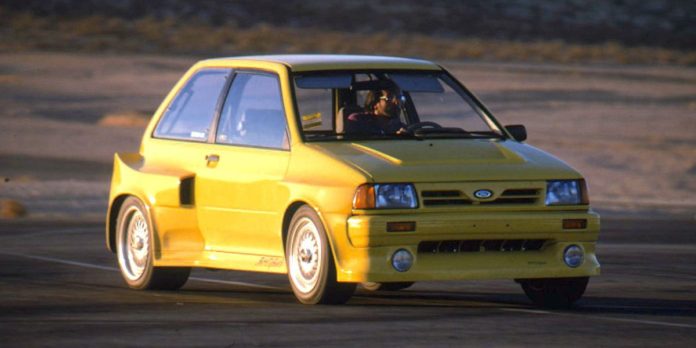From the January 1991 issue of Car and Driver.
Remember Renault’s weird and wonderful RS Turbo, the little rally rat that carried a lusty powerplant where the back seat used to be? Mid-engined, box-fendered, fast and twitchy, the RS Turbo was officially a homologation special for rally competition. History will probably record it as the first econobox on steroids. A new car called the Shogun is from the same school of personal rapid transit.
The Shogun is the aftermarket work of a company called Special Editions, of Upland, California. Special Editions has taken a mild-mannered Festiva and put a Taurus SHO engine and gearbox between its rear wheels. It plans to build 250 of them. We went for an exclusive drive in a proof-of-concept prototype to take a close look at this intriguing project.
The principals at Special Editions bring some motor moxie to the table. There’s Rick Titus (son of the late Jerry Titus, 1967 Trans-Am champion), a driver-consultant-journalist who won the SCCA’s 1987 Escort Endurance SS/GT crown. Then there’s Chuck Beck, whose engineering-fabrication credentials range from the Ford GT40 program in the sixties to today’s Vintage 550 Spyder, a Porsche replicar he builds.
Similarly, the Shogun’s mechanical foundations come well recommended. The Festiva is a sturdy, nicely made economy car. The SHO V-6 engine (220 hp, 24 valves) is perhaps the sweetest high-performance engine fitted to an American automobile today. Beck and Titus gutted the Festiva’s interior and cut away the floorpan and inner fenders in the back. Riding in a steel-tube subframe, the complete SHO powerteam—along with half-shafts, vented disc brakes, and strut/coil-spring suspension from the front of the Taurus—nestles in behind the two Recaro front seats. Front suspension and brakes are also Taurus SHO pieces, and the Shogun keeps the Festiva’s rack-and-pinion steering.
Giant fiberglass fender bulges cover serious-duty Goodyear S-compound ZR tires and BBS wheels: 20S/50ZR-15s on 8.0-inch rims in front, 245/45ZR-16s on 9.5-inchers in back. A safety cell carries fifteen gallons of fuel in the Festiva’s now-vacated front compartment, and a deeply cut-out hood vents the large radiator. Fully wet, this car weighs 2560 pounds: 43 percent of it up front, 57 percent in the rear.
Although our drive confirmed the Shogun’s performance potential (we measured a 0 to 60 time of 5.4 seconds), much work remains to turn the Shogun into a civilized—or at least mildly tamed—roadgoing automobile. The prototype’s exhaust system was unmuffled, the throttle and shift linkage needed further development, and some minor recontouring of the rear-fender bulges was under discussion. Most critically, the car’s handling was just starting to be sorted, with attenti0n zeroing in on adjustments and componentry to make the Taurus front end function properly as a rear suspension.
Of course, with the outsized power and weight of that engine sitting in the back of a tiny, 91.0-inch-wheelbase car, the beast will be darty and eager to change direction no matter how the chassis is tuned.
But that’s the whole point. The Shogun is not a car for everyone. It’s a unique, sharp-reacting little terror that weeds out the general public with its demeanor and its anticipated $47,500 base price. All that will be left will be 250 hot-eyed enthusiasts who simply must own the fastest, craziest shoe box in town.
Specifications
Specifications
1991 Special Editions Shogun
Vehicle Type: mid-engine, rear-wheel-drive, 2-passenger, 3-door coupe
PRICE
As Tested: $47,500
ENGINE
DOHC 24-valve V-6, iron block and aluminum heads, port fuel injection
Displacement: 182 in3, 2986 cm3
Power: 220 hp @ 6000 rpm
TRANSMISSION
5-speed manual
DIMENSIONS
Wheelbase: 91.0 in
Length: 144.0 in
Curb Weight: 2560 lb
C/D TEST RESULTS
60 mph: 5.4 sec
1/4-Mile: 14.3 sec @ 96 mph
100 mph: 17.3 sec
Top Speed: 128 mph
Braking, 70–0 mph: 208 ft
Roadholding, 300-ft Skidpad: 0.86 g
C/D TESTING EXPLAINED

